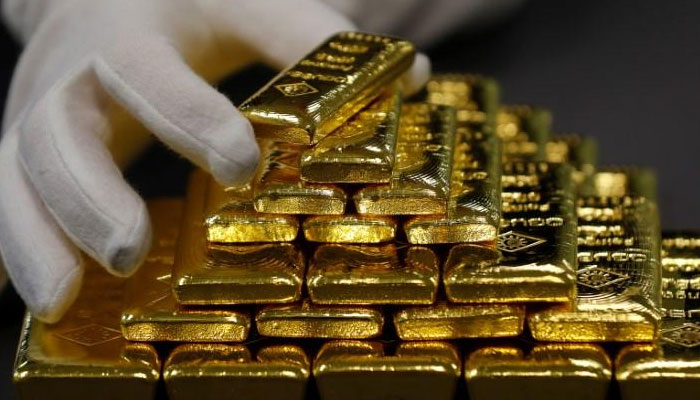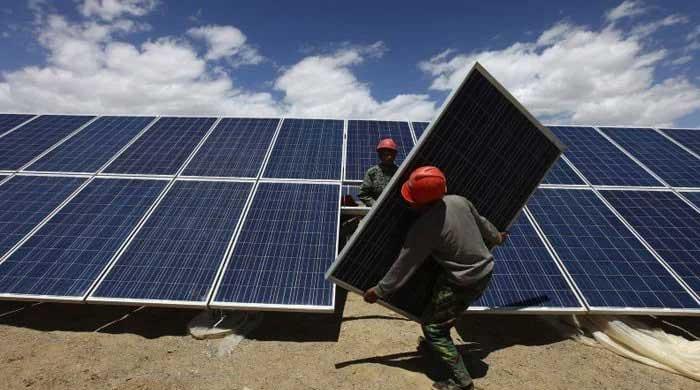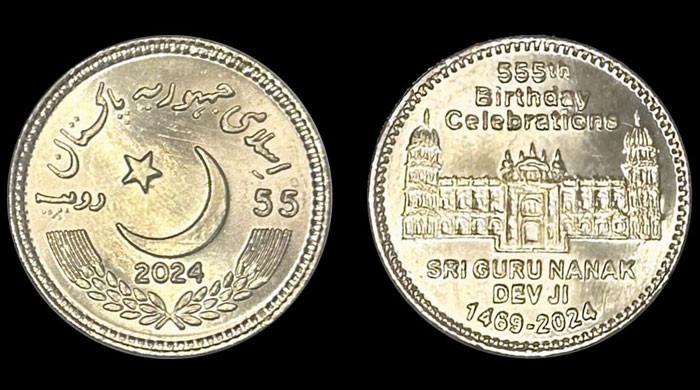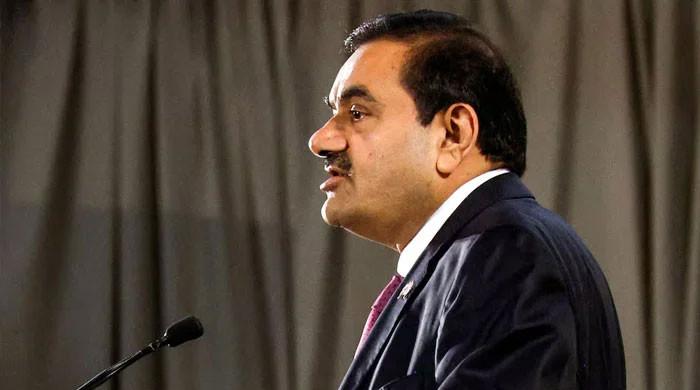Pakistan gold prices surge to record high, crossing Rs123,800 a tola
In the international markets, gold rates shot up $46 to $1,942, registering the highest price since Sept 2011.
July 27, 2020

KARACHI: Gold rates in Pakistan have surged to a record high, crossing the Rs123,800-a-tola mark on Monday, according to the All Sindh Sarafa and Jewellers Association (ASSJA), as markets opened on the first day of the week leading up to the Eid-ul-Azha 2020.
Gold rates issued by the ASSJA indicate that the yellow metal rose Rs5,100, continuing its rally since the past couple weeks, with investors pouring in money as the coronavirus pandemic weakens confidence in other commodities, currencies, and stocks.
In the international markets, on the other hand, gold prices shot up $46 to $1,942, registering the highest rate since September 2011. According to Forbes, gold prices are expected to rise further to $2,000 an ounce.
Last week, bullion had surged for the ninth consecutive day on Friday, reaching Rs118,700. The ASSJA noted that gold rates shot up Rs1,400 a tola (11.66 grammes), while the price of 10 grammes rose Rs1,200 to Rs101,766.
A day prior to that, the precious metal had registered a rise of Rs2,300, clocking in at Rs117,300 a tola despite vaccine trials around the world churning out successful results to curb risks of a recession over the ongoing coronavirus pandemic.
The yellow metal has been been on a steady path to go beyond the $1,900-an-ounce levels in the global markets — past the nine-year peak hit earlier — as fears of economic stagnation grew owing to the skyrocketing coronavirus cases.
Investors seek safety
Gold rates across the world soared to a record high as investors rushed into the safe-haven commodity over concerns stemming from worsening China-US tensions, a spike in the coronavirus infections, and a lack of progress on a new stimulus bill in Washington.
"Always a sign of trouble, gold continued its red hot streak on Monday, the safe haven commodity looking mighty attractive after another troubling weekend of COVID-19 and US-China headlines," said Spreadex analyst Connor Campbell.
With vast monetary easing measures put in place by the Federal Reserve also pushing the dollar lower against most other currencies, gold is flying, with the spot price hitting an all-time high of $1,944.71 per ounce, well above its previous record of $1,921.18 seen in 2011. It later pulled back somewhat.
Relations between the world's two superpowers meanwhile took another negative turn, denting investor sentiment on stock markets. The US flag was lowered at the country's consulate in Chengdu, while the Chinese authorities entered the building as Beijing carried out a Cold War-style retaliatory closure of the mission.
Tete-a-tete
Relations have deteriorated in recent weeks in an intensifying standoff between Washington and Beijing, with the Chengdu mission ordered to shut in retaliation for the forced shutdown of the Chinese consulate in Houston, Texas.
"Technically, the superpowers are all-square in this specific tete-a-tete - but investors are worried about what comes next," noted Campbell.
Related: Gold prices surge to record high amid coronavirus, US-China tensions
At the same time, after months of healthy rallies across equity markets — fuelled by trillions of dollars in government and central bank support — traders are beginning to step back as they weigh the long-term economic impact of the coronavirus.
Eyes are on the Fed's policy meeting this week, with some predicting further measures to boost the economy — possibly negative interest rates — that could put more pressure on the dollar and send bullion above $2,000.
There are also concerns that a worse-than-forecast reading on second-quarter US gross domestic product could spark another dollar sell-off.
The greenback was also down against most other currencies, with the euro at its highest since September 2018.
Equities mixed
Stock markets were mixed as investors fret over the impact of the virus on the economy, with London falling and Paris flatlining.
Frankfurt however rose on a key survey showing that German business confidence rose for the third month in a row in July, as Europe's top economy bounced back from coronavirus lockdowns.
In Asia, Hong Kong, Tokyo, Singapore, Mumbai, and Wellington were all in the red, while Shanghai, Sydney, Seoul, and Jakarta were higher.
Investors are also growing concerned about slow progress on a new US stimulus programme.
Key figures around 10:30am GMT
- Gold: UP 2.0% at $1,940.15 per ounce
- London - FTSE 100: DOWN 0.2% at 6,111.62 points
- Frankfurt - DAX 30: UP 0.3% at 12,878.37
- Paris - CAC 40: FLAT at 4,953.42
- EURO STOXX 50: FLAT at 3,312.67
- Tokyo - Nikkei 225: DOWN 0.2% at 22,715.85 (close)
- Hong Kong - Hang Seng: DOWN 0.4% at 24,603.26 (close)
- Shanghai - Composite: UP 0.3% at 3,205.23 (close)
- New York - Dow: DOWN 0.7% at 26,469.89 (close)
- Euro/dollar: UP at $1.1711 from $1.1656 at 2100 GMT
- Dollar/yen: DOWN at 105.42 yen from 106.14 yen
- Pound/dollar: UP at $1.2832 from $1.2794
- Euro/pound: UP at 91.25 pence from 91.10
- West Texas Intermediate: DOWN 0.1% at $41.24 per barrel
- Brent North Sea crude: DOWN 0.1% at $43.29











